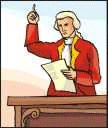Click here to recommend this newsletter to friends, family, teachers, and librarians.
 |
|
|
Today’s newsletter is brought to you by the following sponsors. Please take a look at their offers; without their support, this newsletter wouldn’t be possible.
=============> Click here to Become a Printables Club Member https://www.surfnetkids.com/greatspeeches.htm
One of the delights of Internet research is the availability of primary sources, such as original recordings of political speeches. Whether you’re a student writing a report, or a history buff of any age, you’ll find something of interest in the following speech collections. American Rhetoric: Online Speech Bankhttp://www.americanrhetoric.com/speechbank.htm Michael Eidenmuller, an Assistant Professor of Speech Communication at the University of Texas at Tyler, created a directory of over 5000 speeches, interviews, debates and “other recorded media events. The links are arranged alphabetically by first name (use your browser Find function to search for a specific speaker) and in two special collections: The Top 100 American Speeches and The Rhetoric of 9/11. Each entry notes whether the media is text or Real Audio (which can be either video or audio.) Great American Speecheshttp://www.pbs.org/greatspeeches/timeline/ This PBS timeline covers ninety twentieth-century American speeches, set among relevant historical events. To view the full text of each speech in a pop-up window, click on the Speech tag. Some entries also include audio or video clips. The archive begins with Booker T. Washington’s 1895 speech at The Cotton State Exposition in Atlanta, GA, and concludes with Elie Wiesel’s 1999 speech at a White House symposium that marked the forty-fourth anniversary of the liberation of the Buchenwald concentration camp. History Channel Speecheshttp://www.historychannel.com/speeches/ “Hear the Words that Changed the World.” Each day, the History Channel features a different speech from its vast Real Audio archive. To find a particular speech, browse by category (Politics & Government, Science & Technology, Arts, Entertainment & Culture, War & Diplomacy) or search the alphabetic index (follow the Speech Archive link.) Although this is a terrific source of original audio recordings from around the world, and each entry is annotated with a brief introduction, it does not include text transcripts. History and Politics Outloudhttp://www.hpol.org/ Funded by the National Endowment for the Humanities in partnership with Michigan State University, History and Politics Outloud is a “searchable archive of politically significant audio materials.” The bulk of the hundred-item Real Audio collection is from the sixties and seventies, with a special focus on President Kennedy and the Cuban Missile Crisis, President Johnson and the Warren Commission, and President Nixon and the Watergate hearings. It can be browsed by decade, speaker or title. In addition to the audio, some entries include a text transcript. The History of Televised Presidential Debateshttp://www.museum.tv/debateweb/html/ “On September 26, 1960, John F. Kennedy and Richard M. Nixon made history with the first televised encounter between two presidential candidates.” This unique multimedia exhibit from the Museum of Broadcast Communication in Chicago includes sections on that 1960 debate (“The Great Debate”) and the next seven, ending with the 1996 Clinton/Dole event. In addition to the audiocasts, you’ll find commentary, photos and headlines. For teachers, the Curriculum Resources section includes discussion topics and links to related sites.
|






